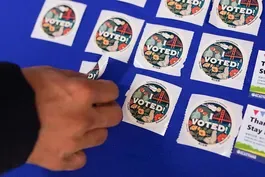
How Super Tuesday may impact the 2024 presidential race
Clip: 3/5/2024 | 8m 42sVideo has Closed Captions
How Super Tuesday may impact the 2024 presidential race
Super Tuesday is the biggest night of the primary election season, as voters in 16 states across the U.S. make their picks for the Democratic and Republican nominee for president. Amy Walter of the Cook Political Report with Amy Walter, Republican strategist Kevin Madden and Democratic strategist Faiz Shakir join Amna Nawaz and Geoff Bennett to discuss.
Problems with Closed Captions? Closed Captioning Feedback
Problems with Closed Captions? Closed Captioning Feedback
Major corporate funding for the PBS News Hour is provided by BDO, BNSF, Consumer Cellular, American Cruise Lines, and Raymond James. Funding for the PBS NewsHour Weekend is provided by...

How Super Tuesday may impact the 2024 presidential race
Clip: 3/5/2024 | 8m 42sVideo has Closed Captions
Super Tuesday is the biggest night of the primary election season, as voters in 16 states across the U.S. make their picks for the Democratic and Republican nominee for president. Amy Walter of the Cook Political Report with Amy Walter, Republican strategist Kevin Madden and Democratic strategist Faiz Shakir join Amna Nawaz and Geoff Bennett to discuss.
Problems with Closed Captions? Closed Captioning Feedback
How to Watch PBS News Hour
PBS News Hour is available to stream on pbs.org and the free PBS App, available on iPhone, Apple TV, Android TV, Android smartphones, Amazon Fire TV, Amazon Fire Tablet, Roku, Samsung Smart TV, and Vizio.
Providing Support for PBS.org
Learn Moreabout PBS online sponsorshipGEOFF BENNETT: Welcome to the "NewsHour."
It is the biggest night of the primary election season.
Voters in 16 states and one territory are making their picks for the Democratic and Republican nominees for president.
AMNA NAWAZ: In a high-stakes election year, with an array of domestic and foreign issues at the top of mind, voters today were weighing their options carefully.
DEBORAH PERGERSON, North Carolina Voter: I want to vote for Trump because I think he's conservative.
He was pro-life.
FRED GRAY, Alabama Voter: Joe Biden.
Overall, I think he done a great job, regardless of what people think of his age.
STEVEN REESE, Colorado Voter: I don't want to have Donald Trump as the option the Republican ticket.
So... CAROL BARDEN, Texas Voter: Well, I'm going to vote for anybody who says they're closing the border.
CINDY SHEEHAN, Colorado Voter: Noncommitted, yes.
I am very concerned about this election.
I don't feel like we have equitable choices.
GEOFF BENNETT: To help us make sense of it all, we're joined now by Republican strategist Kevin Madden, Democratic strategist Faiz Shakir, and Amy Walter of The Cook Political Report With Amy Walter.
With a welcome to all of you.
Amy, luckily, for us, this is known as Super Tuesday and not suspenseful Tuesday.
(LAUGHTER) AMY WALTER, The Cook Political Report: That's right.
GEOFF BENNETT: Because the outcome of these primaries are widely expected to just move Joe Biden and Donald Trump closer to a November rematch.
AMY WALTER: That's right.
That's right.
GEOFF BENNETT: Still, though, what are you watching for?
AMY WALTER: Well, what the margins are is going to be somewhat interesting.
I mean, we have seen from the very beginning of this process on the Republican side Donald Trump go from 51 percent to 53 percent to 68 percent.
In some polls that we have seen in these Super Tuesday states, he's getting over 70 percent of the vote.
So the consolidation does seem complete.
There are going to be a couple of states we will be watching that are traditionally more blue, where independent voters can show up to vote.
And we may see that Nikki Haley has a stronger night there, but not enough to put a meaningful dent in the momentum that Trump has built up.
AMNA NAWAZ: Kevin, weigh in on that now.
Let's take a look at the latest delegate count on the Republican side.
As Geoff mentioned there, Mr. Trump is well on his way to securing that 1,215 needed to secure the Republican nomination there.
But he does still face a challenger in Nikki Haley, one, we should mention, who's not facing 91 charges on four criminal cases.
Could we see voters' concern over that show up today?
KEVIN MADDEN, Republican Strategist: Well, so far, we have not seen it.
I think a lot of the -- in a primary context, the -- Trump's legal problems have actually had a Republican antibody effect, in the sense that they have rallied the strongest base MAGA voter to his defense.
So -- but that's in a primary context.
And so I think, after tonight, we will see that Donald Trump will probably as a mathematical certainty be the nominee and Nikki Haley will have a mathematical impossibility to the nomination.
But I think we will also see the continued challenges that Donald Trump faces in a general election.
So, tonight, I'm going to be watching some of these suburban areas in places like Virginia and North Carolina, places that have traditionally been the battleground areas of battleground states.
And if we still see Trump struggle with those voters, Republican-leaning, pragmatic, independent-minded Republicans, he's going to need those voters that are now voting for Nikki Haley.
He's going to need them in the general election if he's going to beat Joe Biden and he's going to win the Electoral College to become the next president.
GEOFF BENNETT: And, Faiz, four years ago, now-President Biden, he won 10 out of the 14 contests on Super Tuesday, a strong showing.
Today, he's expected to sweep the entire thing as the incumbent.
Still, though, what might we learn about his strengths and weaknesses as a candidate?
FAIZ SHAKIR, Democratic Strategist: We're trying to still see whether there's voter intensity for Joe Biden.
In order to win, he's got to have a record turnout like he had in 2020.
According to recent New York Times poll, you see some drop-off of his own voter base, people indicating, at least according to that poll, maybe only 80 to 83 percent, 85 percent are sticking with him, those who voted in 2020 for Joe Biden.
That number has to be much higher.
For Donald Trump, it's actually 97 percent.
Those people who voted for him are indicating a high intensity of staying with him.
The presence of Nikki Haley could have some significance here.
If she continues on in this race, as we saw last time, she triggers Donald Trump.
I mean, he spent a lot of time calling her birdbrain, attacked her husband, attacked her identity and her birth name.
I think he's wanted her out of the race.
And the longer she stays in it triggers him.
And I think it triggers him in an unhealthy way where he continues to affirm to a lot of these voters that Kevin was talking about that he ain't for them.
And so I -- that -- to me, that's the biggest question of tonight.
Does Nikki Haley choose to stay in, and if she does, how she triggers Donald Trump in his worst elements.
AMNA NAWAZ: Amy, we heard from some of those voters there talking about what matters to them, what's animating them to the polls.
State by state here, what are you going to be watching for in terms of the issues that will either drive turnout or kind of keep people unenthused and staying home?
AMY WALTER: Well, in a number of these states, we also have congressional primaries.
And Alabama is a good example of this.
The courts determined that the state will now have two majority-Black districts.
And so they're -- for the very first time, voters in this one district get their own representative.
So you may see turnout up in some places because of the competitive races lower on the ballot, rather than the - - usually, it's the top of the ticket that's driving people out to vote.
We have competitive races in California.
We have competitive races in North Carolina in primaries.
So I think those things, I'm watching as well, because it's going to tell us -- since so many of these districts are overwhelmingly red or overwhelmingly blue, it's going to tell us a lot more about what the next Congress could look like, because these folks, for them, this is the most competitive contest they will have.
By the time November comes around, it'll be a foregone conclusion who will be coming to Congress.
And so we get a pretty good snapshot or a look into what -- the kind of people coming into Congress we will be talking about.
GEOFF BENNETT: Kevin, we will see how much longer Nikki Haley stays in this race after tonight.
If she drops out soon, where do her voters go, do you think?
KEVIN MADDEN: Well, I think they have parked themselves in undecided.
And that will be the big charge and the big challenge that Donald Trump has from here all the way to November is, can he turn those voters who right now are registering support for Nikki Haley in a sort of a protest against Donald Trump -- and whether or not he can eventually by November get them to hold their nose and say, OK, I don't necessarily like Donald Trump, but he's better than Joe Biden.
And that will be the big challenge for him from here all the way to November.
AMNA NAWAZ: Faiz, speaking of the protest vote, we did see that protest vote when it came to President Biden in Michigan, over 100,000 people showing up to vote uncommitted in protest of President Biden's handling of Israel's war in Gaza.
Do we expect to see more of that today?
FAIZ SHAKIR: Oh, for sure, yes.
You will see it in Minnesota and a few other places where there will be people -- people will be casting this uncommitted vote.
And we should all know and understand a couple of things about it.
One is, we want in democracy people to be voting and expressing their pain and angst.
Right now, it gives Joe Biden, quite frankly, the time to address it.
And the only way he can address it is by changing policy.
And he's got an opportunity to do that coming up on Thursday.
He's got his State of the Union.
By all accounts, he's working very hard on trying to get a cease-fire deal, a six-week cease-fire deal that could be game-changing for at least trying to move towards some resolution of the conflict and end it.
But nothing's going to change for Joe Biden until he can show policy change.
And I know that they're breaking their necks to try to figure that out.
And, meanwhile, voters are kind of continually going to put political pressure on the system, as they should, to see a change happen.
GEOFF BENNETT: And, Amy, quickly unrelated to Super Tuesday, Arizona Senator Kyrsten Sinema announced today that she's not seeking reelection.
What does that do to the Senate landscape?
AMY WALTER: Well, this seat was already going to be very, very competitive.
What we see now is a battleground state with very clear Democrat and Republican, but those Democrat and Republican very different from the types that have come before them.
They don't come from the moderate lane.
They come more from the more progressive and more conservative lane, so winning over independent voters is going to be a challenge for both of them for different reasons.
GEOFF BENNETT: And her exit is Ruben Gallego's gain, the Democrat in that race?
AMY WALTER: Theoretically, although she was also, Sinema, that is, taking a lot of Republican votes as well from those kinds of voters that Kevin was talking about who in the era of Trump feel like they don't have a home and Sinema's independence was attractive to them.
GEOFF BENNETT: Amy Walter, Faiz Shakir, Kevin Madden, our thanks to all three of you.
Austin theater company preserves Latin American culture
Video has Closed Captions
Austin theater company works to preserve Latin American culture (2m 55s)
‘Burn Book' explores a life covering the tech industry
Video has Closed Captions
‘Burn Book' explores Kara Swisher’s life and complicated relationship with tech industry (6m 58s)
California voters decide consequential U.S. Senate race
Video has Closed Captions
California voters decide consequential U.S. Senate race (6m 32s)
Family members of hostages give opposing views on Gaza war
Video has Closed Captions
Family members of hostages offer opposing perspectives on war in Gaza (9m 55s)
What's behind the stunning rise in alcohol-related deaths
Video has Closed Captions
What's behind the stunning rise in alcohol-related deaths (5m 51s)
Providing Support for PBS.org
Learn Moreabout PBS online sponsorshipSupport for PBS provided by:
Major corporate funding for the PBS News Hour is provided by BDO, BNSF, Consumer Cellular, American Cruise Lines, and Raymond James. Funding for the PBS NewsHour Weekend is provided by...
















